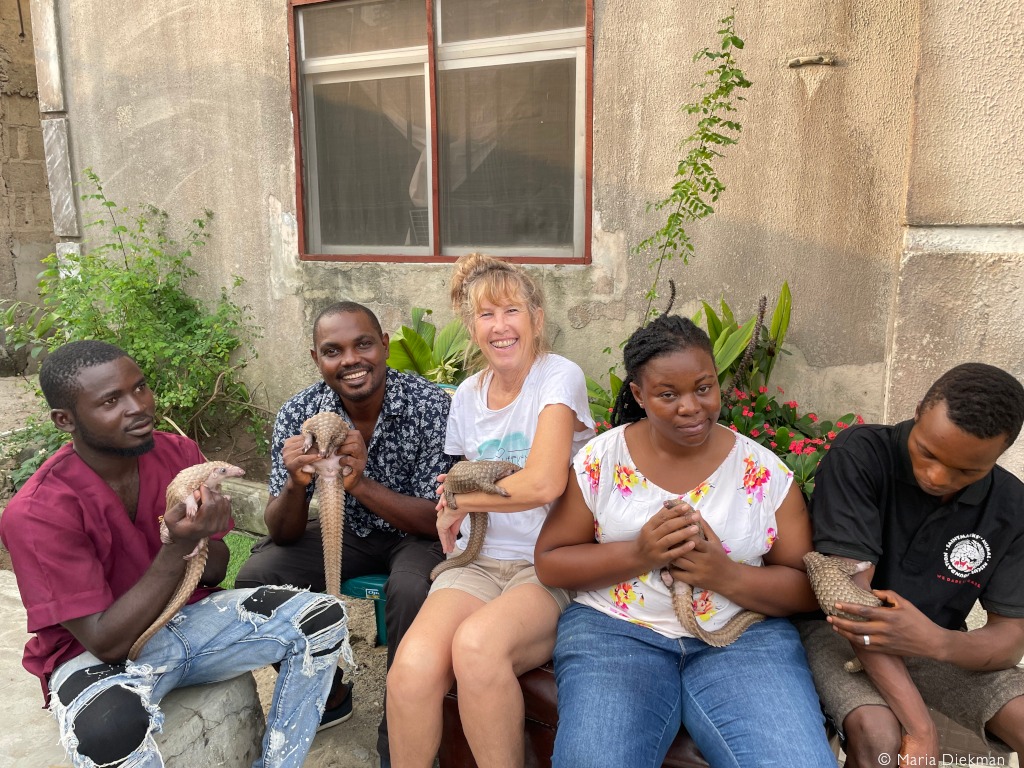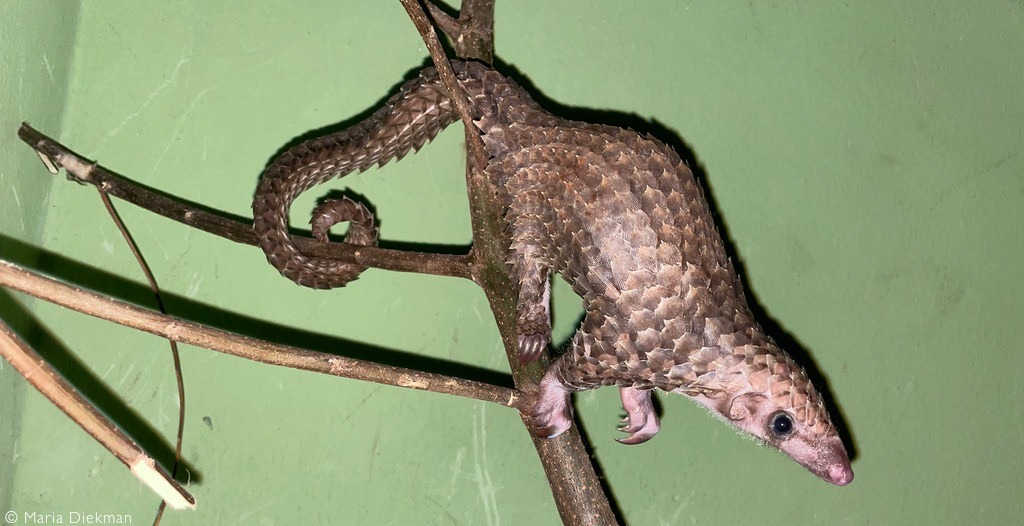I run an animal charity called the Rare & Endangered Species Trust (REST), which focuses on the rescue and re-release of wild animals. My speciality is the raising, rehabilitation and research of ground pangolins (Smutsia temmickki). In mid-2021, I found myself with no pangolins under my care for the first time in a decade. Politics and COVID-19 seemed to be delaying new animal permits, and I had taken time off to write a book. Then, one day I opened up my email and found a plea to help raise five white-bellied pangolin pups in Nigeria.
Soon I was in touch with Mark Ofua, who runs the St Marks Animal Rescue Foundation in Lagos. It is the only animal shelter in a city of 24 million people and accepts any animal for rescue, rehabilitation and rehoming – domestic or wild.

A long way to go
It was intimidating. Nigeria is very far away, REST’s funds are extremely limited, and I had never worked with white-bellied pangolins before. They are tree pangolins found in northern and central Africa. They’re highly adept climbers with all four feet and their long tails operate as hook, hoist and anchor.
When I asked what to expect on arrival, Mark calmly explained that I should bring everything I might need and expect “ground zero”.
No one in the world had ever tried to raise five pangolin pups of any species simultaneously. The few of us who have successfully raised pups of any species will tell you these scaly mammals are some of the hardest animals to raise. They need complete devotion, while veterinary and dietary needs are sketchy, and there are no established protocols for the release, tracking and monitoring of tree pangolins.
One of REST’s donors jumped in, and within weeks I had a visa and plane ticket and was packing a few clothes and as many veterinary items as possible.
I arrived in a different world – full of people, traffic, noise and pollution. I knew heat from Namibia, but mixed with humidity, the hours going through immigration were stifling. I walked with my trolley full of bags to the pick-up area, followed by ten chancers offering to help for a fee. Once in Mark’s car, I was introduced to the traffic of Lagos, which is incomparable to anything I’d seen before. It was rather overwhelming, but I instantly felt at home when we arrived at St Marks’ tiny clinic and met the pangolins.

Very little sleep
Upon arrival, I was especially concerned about the health of two pups. Numbers 3 and 5 were weak – refusing to take the bottle. As a result, Number 5 had a lung infection and almost died soon after I arrived.
It is a horrible experience to watch an animal weaken, especially in the absence of a proven treatment protocol. We had to rely on gut feel, the equipment available and experience. Treatment began with antibiotics, rehydration and vitamins.
Number 5 needed constant care and coaxing to eat as many small meals as often as possible. I also had four other pups to feed and so quickly designed a schedule that allowed each pup one hour, four times a day. That took up to 20 hours, and number 5 needed extra care throughout the night. Needless to say, I was sleep-deprived and amazed the St Marks staff by being able to fall asleep instantly and deeply for short periods whenever I could!

Results and data
Soon, Number 5 started to recover, Number 3 strengthened, and the others continued to feed well. Eventually, feeding would begin at 08h00, and the third and final feed would end around 01h00. As they grew, exercise also became a key need and since we were in the middle of a large city, going outside was not possible.
We designed a playpen in my room, furnished with sand, artificial grass and tree branches. Soon, each pangolin was spending time developing the coordination they would need in the wild.
Having five pangolins raised under the same conditions at the same time by the same person allowed us to collect valuable data about veterinary care, diet, and exercise requirements. This will be very useful in setting up protocols for the rescue and rehabilitation of the white-bellied pangolin.

Life in Lagos
I rarely left the babies, as their care schedule did not allow me to be away for more than a few hours at a time. Once a week, Dr Kalista and I would go food shopping. I also ventured out to walk the dog named Tongo I’d adopted from Mark’s shelter. The pangolins were thriving under my care, preparing for release and providing invaluable data for the species.
Unfortunately, in August 2021, disaster struck on a personal level. Food poisoning soon had me barely able to move, and I was having difficulty caring for the pups, so it was decided that I should recover in a nearby, inexpensive hotel. After two days, I was beginning to recover and then suddenly, my health deteriorated. I tested positive for malaria and was hospitalised. What followed was a fight for my life and, finally, the tough decision to return to Namibia to heal with my family.
I was heartbroken but too weak to protest, and Dr Kalista took over the care of my pups. We are in constant touch, and I have used the time in Namibia to heal but also source and buy camera traps and pangolin trackers in preparation for the white-bellied pangolin releases.

Success
The heaviest, named Sunny after a special donor and the only female, is ready for release (as of October 2021). Aiden (Number 5), who was so sick, should be ready sometime in early 2022, with others leaving in between.
I intend to spend at least three months a year at St Mark’s, helping with pangolin rescue and rehabilitation. The facility receives animals daily and pangolins at least once a week, so we have big plans for the future. Currently, there is a small, dedicated staff of six and resources are pushed to the limit. We hope to soon offer internships and sabbaticals for vets, biologists, and others with a passion for conservation while raising funds for a dedicated pangolin rescue centre – Nigeria is now the world’s leading pangolin trafficking country.
Resources
For more on pangolin releases see here
For more on pangolin biology see here
There is a wealth of engaging pangolin information and stories here
About the author
Maria Diekmann established the Rare & Endangered Species Trust in 2000 and has been the director for the past 21 years. She is most well known for her work with Cape griffons and Cape/ground pangolins. Maria remains passionate about combining conservation with research and education and is now continuing her work with pangolins in other countries to better understand and train others in raising and rehabilitating these fragile species.
To comment on this story: Login (or sign up) to our app here - it's a troll-free safe place 🙂.![]()






